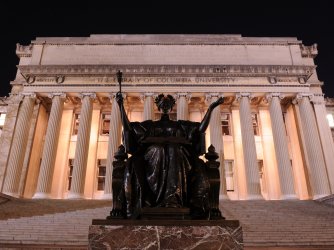Table of Contents
Orientation or indoctrination? Forcing political doctrine on students is an affront to the First Amendment and higher education

It was August 2015, and I was entering Hampshire College as an excited freshman, ready to begin an undergraduate career that I hoped would be characterized by exploration and intellectual challenge. Hampshire appealed to me because it advertised itself as an institution that fostered civic-mindedness, emphasized critical inquiry and academic rigor, and stood by progressive values. I assumed that most of my incoming class applied for similar reasons. Hampshire sounded like an ideal institution for independent thinkers. This was going to be a dream come true! Unfortunately, the opposite was the case, and prompted my transfer to my current school. It quickly became clear that Hampshire’s advertisements were disingenuous (or I just didn’t know what being progressive actually meant), and that it was infringing on its students’ freedom of conscience to advance a political and social agenda. These weren’t the progressive values I stood by.
After I arrived, I quickly became concerned with how orientation was being conducted. Orientation, it seemed, was being exploited by Hampshire as an opportunity to indoctrinate students — a program designed to inculcate incoming students with officially approved ideological and philosophical positions on contested issues. Mandatory for incoming students, the multi-day event was filled with workshops, lectures, and activities that presented the authorized and “correct” values that the school expected students to internalize, believe, and conform to. We were told that these events were “promot[ing] engagement with the values of our community,” and were to be reached through “challenging (our) beliefs,” and through having “difficult and important conversations.” In practice, however, it felt as though we were expected to just accept — rather than engage critically with — those values. Most of orientation was didactic, controversial, and presented in a manner that intruded upon students’ freedom of conscience.
Day after day, my orientation group spent extended amounts of time learning how to foster certain politically loaded values. For example, the presenters and orientation leaders denounced the existence of people “with privilege” — white, heterosexual men like me. We were taught that the privileged were either intentionally or unintentionally culpable — and definitely complicit — in systematic oppression. Due to America’s history, they said that we had the most power, and that if a privileged person’s thoughts, speech, or behavior does not sufficiently acknowledge this inherent power, they are guilty of perpetuating oppression. We were taught how to practice “being an ally,” which consisted of a list of specific guidelines and practices that members of privileged groups were expected to abide by when interacting with members of disadvantaged groups. We were taught the “truth” that “racism is [only] something imposed by white people for the advantage of white people.” We were taught that it was impossible for members of an oppressed group to discriminate against a privileged group, and that oppressed people couldn’t be racist towards whites. We were taught to believe that identities are deterministic of dignity and character, as we were judged by our skin color and identities.
Our orientation leaders tasked students with the duty of policing peers for incorrect speech, and obliged us to condemn terms, phrases, and actions (and people for that matter) that purportedly indicate the level of privilege, ignorance, and oppressiveness of the speaker. Examples of such phrases included asking a minority student where they are from, calling America a “melting pot,” and claiming that reverse racism exists. We were told that we were “learning how to combat oppression in its various forms.” We were told that speech that people find offensive or emotionally disturbing was a form of violence. Our speech was being restricted to only what was socially coerced. When I spoke up about my concerns with the orientation’s content and manner, I was told that I was perpetuating oppression, and that as a white man, I had to “shut up and listen.” This discouraged students from speaking openly unless it was to voice agreement. I was told repeatedly by the orientation leaders that my questions and opinions were indecent and harmful, and that I needed to watch my mouth — and my thoughts — if I wanted to do well on campus. I was told that because I had privilege, I had no right to criticize these teachings. One thing was clear, iconoclasm was not welcome here.
While there are social theories that support what Hampshire was teaching me, there are others that do not. If there are conflicting theories, presenting just one as the ultimate truth is the opposite of encouraging the kind of critical thinking and inquiry the school purports to value, especially since students were told that these were definitive truths consistent with community values.
My peers reported similar experiences when I asked them about their orientation leaders’ presentations; however, they seemed to accept it. After all, our orientation leaders were following Hampshire’s guidelines. From what I could tell, orientation had a powerful and lasting effect on campus culture. Throughout my year at Hampshire, I observed how prevalent the attitudes imposed on us during orientation were among the student body. The professors of our mandatory social justice classes corroborated the orientation’s teachings with class content and lectures, further purveying the doctrine, and fortifying the campus orthodoxy. Many students looked up to these professors as infallible, and saw the classes as validation for their beliefs and practices. The thought reform and reeducation that began at orientation had inspired many students to take up the cause of the specific type of social justice activism promoted by the school. Dissent and disagreement had become heresy in the campus culture.
I attempted to show my peers how pernicious and dire I thought the whole situation at Hampshire was, but many were intransigent and hostile. I was denounced for voicing discontent with the doctrine, since my dissent was perceived as an act of oppression and violence. I felt like my peers had lost sight of what was really important, and throughout the year, I slowly became disillusioned by the whole experience. It was awful to see my peers undergo something to their detriment that they weren’t even aware was happening. I felt wary of higher education, and disconcerted about the future of free speech and intellectualism. I was able to find a few friends who recognized my desire to discuss these matters openly, without inhibition and worry of denunciation or reprimand, as important and valid.
I finally decided to leave Hampshire, as I felt my efforts to raise awareness of the phenomenon were futile and counterproductive. I felt like I couldn’t be a serious student in such an anti-intellectual environment. I desperately wanted to spark rigorous debate, but this backfired. The hyperbole had turned into hysteria and became self-fulfilling. I had to leave campus if I wanted to combat this issue effectively.
I transferred to the University of Rhode Island, where I find the culture to be much more accepting of diverse opinions, and without pervasive ideological presumptions. My experience at Hampshire was frustrating, but inspired me to take serious action in the study of this phenomenon and the protection of free speech, which FIRE has enabled.
What I experienced at Hampshire runs contrary to the purpose of higher education. I can’t think of a more amoral, arrogant, and intrusive action than forcing students to conform and comply with specific ideological presumptions and beliefs through indoctrination. College should be a place where our deeply held beliefs can be challenged by our peers and ourselves. This practice of higher education is built on the notion that to be effective citizens and learners, we must expand our viewpoints and reject orthodoxy, as the opposite only leaves us ignorant. Hampshire effectively taught many of us the contrary. Because a number of other schools have been known to employ similar methods — not necessarily in orientation, but through a variety of different techniques and devices — students should be aware.
If your freedom of conscience is infringed upon, take action. Speak up, don’t give in.
To learn more about this topic — and your rights as a student — check out FIRE’s Guide to First-Year Orientation and Thought Reform on Campus.
Sam Foer is a rising junior at the University of Rhode Island and a FIRE summer intern.
Recent Articles
FIRE’s award-winning Newsdesk covers the free speech news you need to stay informed.

Campus encampment bans rarely violate the First Amendment. Here’s why.

University provosts have bleak outlook on free expression in higher ed

With colleges punishing student protesters, campus due process is more important than ever
